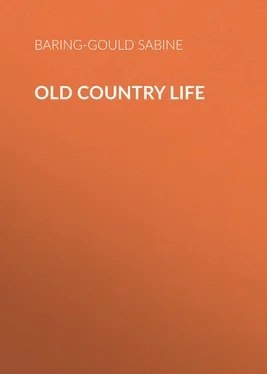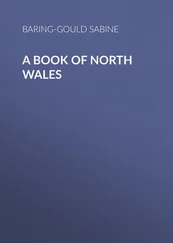Sabine Baring-Gould - Old Country Life
Здесь есть возможность читать онлайн «Sabine Baring-Gould - Old Country Life» — ознакомительный отрывок электронной книги совершенно бесплатно, а после прочтения отрывка купить полную версию. В некоторых случаях можно слушать аудио, скачать через торрент в формате fb2 и присутствует краткое содержание. Жанр: foreign_antique, foreign_prose, на английском языке. Описание произведения, (предисловие) а так же отзывы посетителей доступны на портале библиотеки ЛибКат.
- Название:Old Country Life
- Автор:
- Жанр:
- Год:неизвестен
- ISBN:нет данных
- Рейтинг книги:5 / 5. Голосов: 1
-
Избранное:Добавить в избранное
- Отзывы:
-
Ваша оценка:
- 100
- 1
- 2
- 3
- 4
- 5
Old Country Life: краткое содержание, описание и аннотация
Предлагаем к чтению аннотацию, описание, краткое содержание или предисловие (зависит от того, что написал сам автор книги «Old Country Life»). Если вы не нашли необходимую информацию о книге — напишите в комментариях, мы постараемся отыскать её.
Old Country Life — читать онлайн ознакомительный отрывок
Ниже представлен текст книги, разбитый по страницам. Система сохранения места последней прочитанной страницы, позволяет с удобством читать онлайн бесплатно книгу «Old Country Life», без необходимости каждый раз заново искать на чём Вы остановились. Поставьте закладку, и сможете в любой момент перейти на страницу, на которой закончили чтение.
Интервал:
Закладка:
Now let us consider what was the origin of our county families.
Some have been estated, lords of manors, for many centuries, but these are few and far between. Then comes a whole class of men who worked themselves up from being yeomen, small owners into great owners, by thrift and moderation. I know some cases of small holders of land, who have held their little properties for three or four centuries, but who have never advanced in the social scale. Others have added field to field, have taken advantage of the improvidence of their neighbours, and have bought them out. Then they have risen to become gentry. But the most numerous class is that of the well-to-do merchants, who have bought lands and founded families. In my own county of Devon this is the history of the origin of a considerable number of those families which claimed a right to bear arms, and proved their pedigrees before the heralds at the beginning of the seventeenth century. Dartmouth, Totnes, Exeter, Bideford, Barnstaple – all the great commercial centres – saw the building up of county families. The same process which began in the reign of Elizabeth has continued to this day, and will continue so long as the possession of a country house and of acres proves attractive; and may it long so continue, for what else does this mean than the bringing of money into country places, and not of money only, but of intelligence, culture, and good fellowship?
One of the most extraordinary phenomena of social history in our land is the way in which the landed aristocracy have become extinct in the male line; how families of note have disappeared, as though engulfed like Korah and his company. Recklessness of living and ruin will not account for this. It is not that they have parted with their acres that surprises us, but the way in which the families have disappeared, as if snuffed out altogether.
It is feasible – I do not say easy – to trace a family of quite ordinary position with certainty through many generations. Whoever had any property made a will, or, if he neglected to make a will, had an administration of his effects taken by the next of kin after his death; and will or administration tell us about the man and where he lived. Then we refer to the parish registers, and with their assistance get some more information. There are other means by which additional matter may be acquired. Thus it is quite possible to draw a pedigree – a genuine, well-authenticated one – of almost any tradesman's or yeoman's family from the time of Elizabeth.
Now Lieutenant-Colonel Vivian has spent infinite pains in tracing the genealogies of those families in the West of England which bore arms, and were accounted gentle at the beginning of the seventeenth century down to the present day. For this purpose he has searched all the wills extant relative to Devon and Cornwall, and most of the parish registers in these counties. Consequently, we can take his conclusions as being as reliable as they can well be made.
In the sixteenth and seventeenth centuries the heralds made periodical visitations of the counties, and noted down the pedigrees of the gentle families, enrolled such as had a right to bear arms, and disqualified as ignobiles such as had assumed the position and arms of a gentleman without legitimate title.
In the county of Devon there were visitations by the heralds in 1531, 1564, 1572, and 1620, this last was the final visitation made. Now in the lists then drawn up appear fourteen gentle families under letter A, forty-seven under B, sixty-three under C.
Of the fourteen whose names began with A, the Aclands alone remain. Of the forty-seven whose names began with B, only five remain. Of the sixty-three under C, fifty-eight are gone. Some few linger on, represented in the female line, but such are not included, though the descendants may have taken the ancient name.
How are we to account for this amazing extinction? The families were prolific, but apparently those most prolific most rapidly exhausted their vitality.
The Arscotts go back to the beginning of the reign of Henry VI., and spread over the north of Devon. John Arscott of Arscott, who died in 1563, had eight sons. His eldest son Humphry had indeed but two, but of these, the eldest and heir had two, and the second had six; yet in 1634 the estates devolved on a daughter.
John Arscott in 1563 had three brothers. Of these the next, Thomas, married a Bligh in 1551, and had four sons. Of these the descendants of one alone can be traced to a certain Roseclear Arscott of Holsworthy, who left four sons; all these died without issue. The son and heir is buried at Whitchurch, near Tavistock, with the laconic entry – "Charles Arscott, gent., of age, but not worth £300; buried 23 March, 1704-5."
The third of the four – of whom John Arscott was the eldest – was Richard, who left four sons. Of these the second, Humphry, was the father of seven, and Tristram, the eldest, of two. Tristram's family died out in the male line in 1620. Of the seven sons of Humphry all traces have disappeared. The fourth was John Arscott of Tetcott, he, like his elder brothers, a man of good estate. His family became extinct in the male line in 1788.
The Crymes family, of Buckland Monachorum, was vastly prolific. William Crymes, who died in 1621, had nine sons; of these, as far as is known, only three married – William, Lewis, and Ferdinando. William left but one son; Lewis had a son who died in infancy, and that son only; Ferdinando had a son of the same name, whose only son died within a year of his birth. Ellis Crymes, the son of William, and inheritor of the estate, married twice, and had by his first wife, a daughter of Sir Francis Drake, as many as ten sons; by his second wife he had six more. Of the ten first only eight had children; and of the offspring of the second batch of six not a single grandchild male lived. In two generations after this prolific Ellis with his sixteen sons, the whole family disappears. I do not say that it is absolutely blotted out of the land of the living, but it is no longer represented in the county, nor can it be traced further.
I can give an excellent example in my own family, as I have taken great pains to trace all the ramifications. In the Visitation of 1620, John Gould of Coombe in Staverton is represented as father of seven sons; and Prince, who wrote his Worthies of Devon , published in 1701, in mentioning the family, comments on its great expansion; yet of all these sons, who, one would have supposed, would have half peopled the county, but a single male lineal representative remains, and he is over fifty, and unmarried.
The Heles were one of the most widely-spread and deeply-rooted families in the West of England. At an assize in Exeter in 1660, when Matthew Hele was high-sheriff, the entire grand-jury, numbering about twenty, was all composed of men of substance and quality, and all bearing the name of Hele. Where are they now? Vanished, root and branch.
Where are the Dynhams, once holding many lordships in Devon? Gone, leaving an empty shell – their old manor-house of Wortham – to show where they had been.
In the seventeenth century John Bridgeman, Bishop of Chester, father of Sir Orlando Bridgeman, and ancestor of the Earl of Bradford, bought the fine old mansion, Great Levers, that had at one time belonged to the Lever family, then had passed to the Ashtons. He reglazed his hall window, that was in four compartments, with coats of arms. In the first light he inserted the armorial bearings of the Levers, with the motto " Olim " (Formerly); in the next the arms of the Ashtons, with the legend, " Heri " (Yesterday); then his own, with the text, " Hodie " (To-day); and he left the fourth and last compartment without a blazoning, but with the motto, " Cras, nescio cujus " (Whose to-morrow, I know not).
Читать дальшеИнтервал:
Закладка:
Похожие книги на «Old Country Life»
Представляем Вашему вниманию похожие книги на «Old Country Life» списком для выбора. Мы отобрали схожую по названию и смыслу литературу в надежде предоставить читателям больше вариантов отыскать новые, интересные, ещё непрочитанные произведения.
Обсуждение, отзывы о книге «Old Country Life» и просто собственные мнения читателей. Оставьте ваши комментарии, напишите, что Вы думаете о произведении, его смысле или главных героях. Укажите что конкретно понравилось, а что нет, и почему Вы так считаете.












